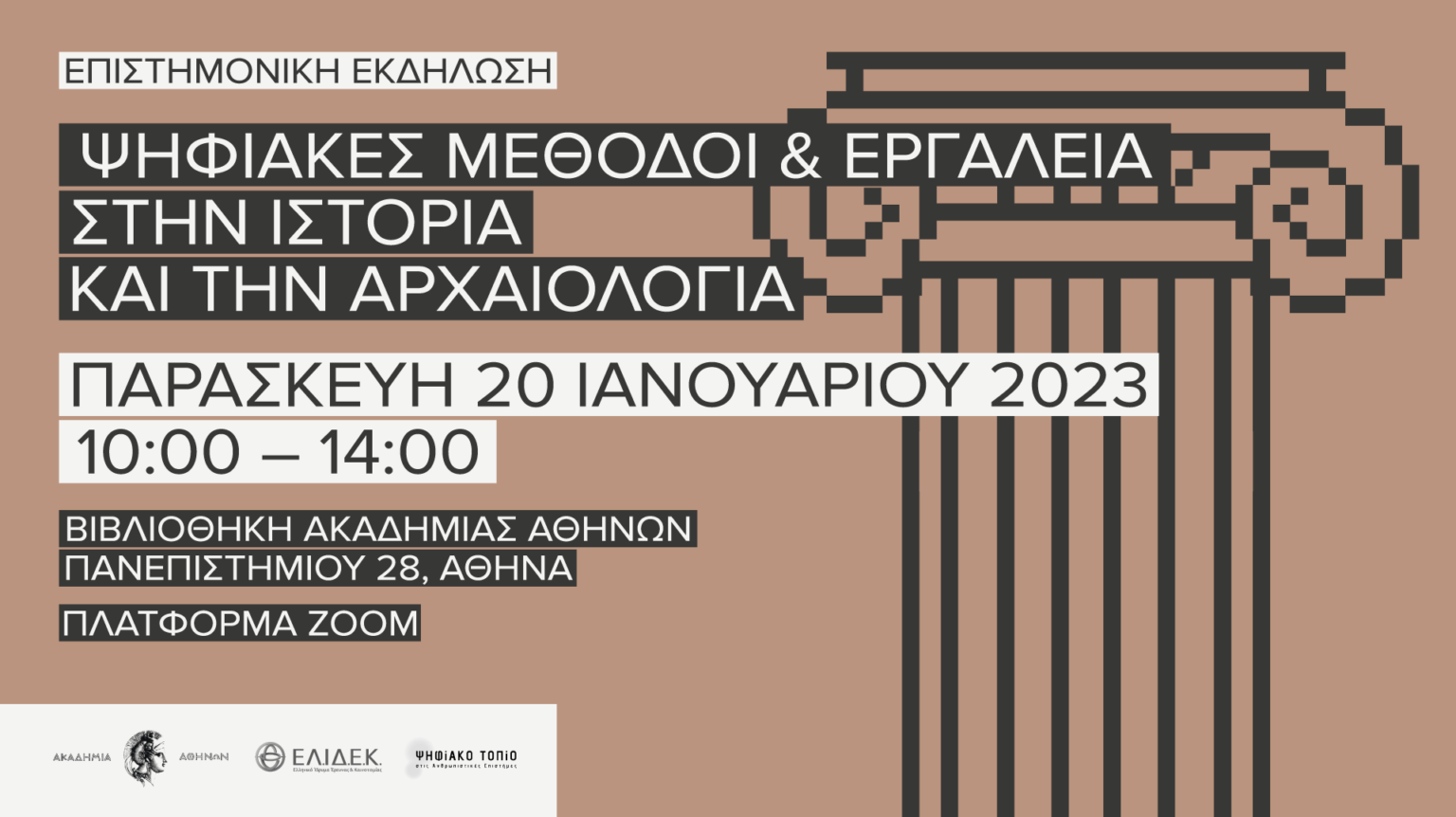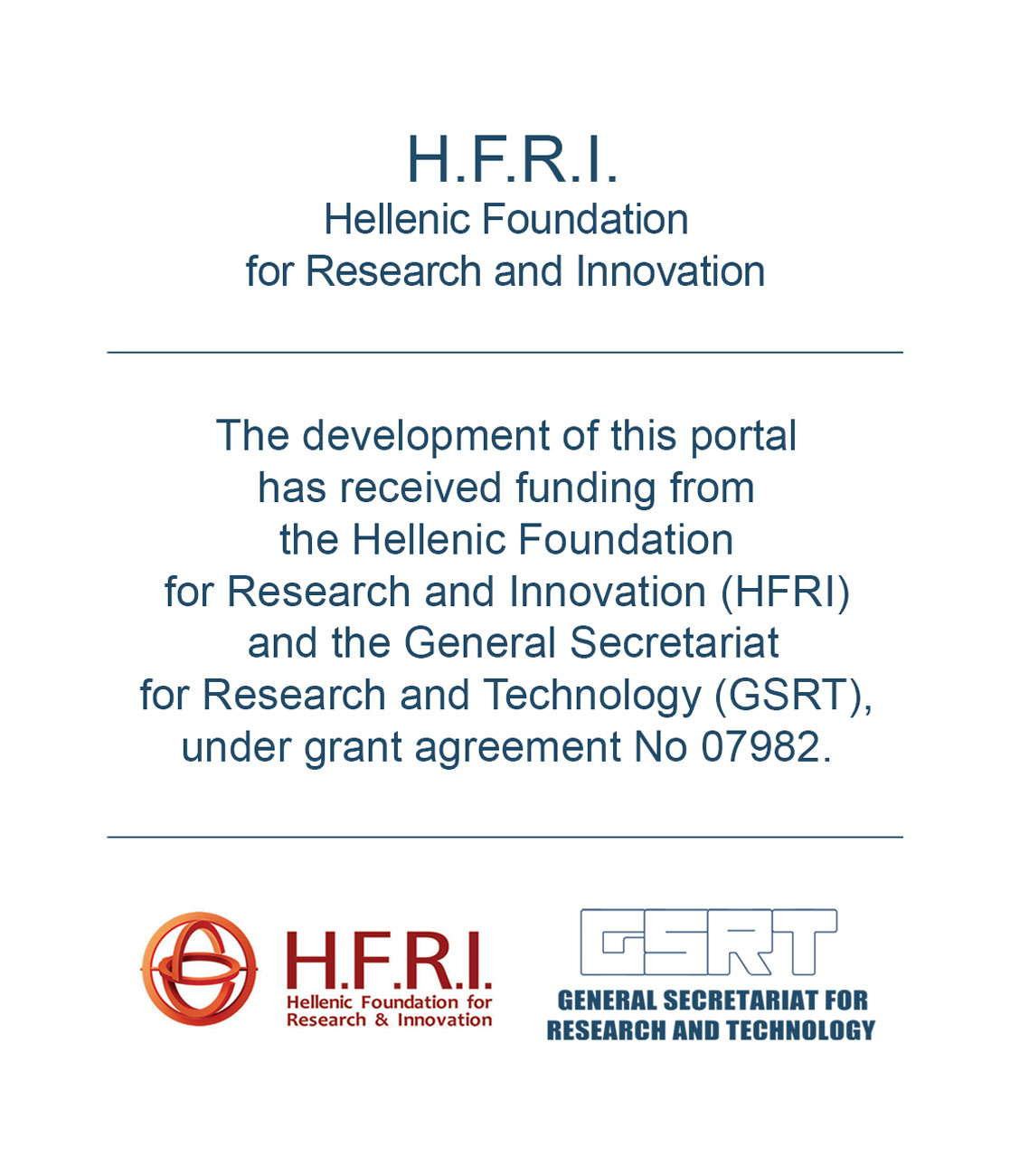Digital methods and tools in History and Archaeology
Humanities and Social Sciences Focus Groups
January 20, 2023
Library of the Academy of Athens
Organiser: Academy of Athens

On Friday, January 20, 2023, the Academy of Athens held a meeting entitled “Digital methods and tools in History and Archaeology” organised in the framework of the project “The emerging landscape of digital work in the Humanities to discuss practices of digital work in the humanities“. It was the second meeting of the project, following the one on November 30, 2022, which had focused on the fields of Folklore, Social Anthropology and Oral History.
The meeting was a hybrid event and took place in the Library of the Academy of Athens with physical and online presence, and featured the following invited speakers:
Paris Potiropoulos, Research Center of Greek Folklore, Academy of Athens, scientific coordinator for DARIAH-GR/DYAS
Sevasti Triantafillou, Department of History and Archaeology, Aristotle University of Thessaloniki
Despina Tsiafaki, Department of Culture and Creative Industries, Speech Processing Institute, Athena Thrace Research Center
Konstantinos Kopanias, Department of History and Archaeology, National and Kapodistrian University of Athens
Vasilis Evaggelidis, Athena Xanthi Research Center, Department of Cultural Heritage
Evangelia Kyriatzis, Fitch Laboratory BSA, British School at Athens
Ilias Sturaitis, Democritus University of Thrace
Charalambos Gasparis, Department of Byzantine Research, National Research Foundation (NRF)
Despina Valatsou, Department of Theory and History of Art, School of Fine Arts
Antonis Chatzikyriakou, Department of Political Science and History, Panteion University
The debate was moderated by Maria Spiliotopoulou, Director of Research at the Research Center for the History of Modern Hellenism of the Academy of Athens, and historian Giorgos Tzedopoulos, a Research Associate of the Academy of Athens DYAS team.
The questions put to the speakers were similar to those of the first meeting and concerned the new research fields opened up through digitality, the compilation and archiving of digital documents, the organization of information, the use of standards, vocabularies and metadata schemas, and finally the challenges brought about by the digital condition for the specific scientific disciplines in terms of their theoretical and methodological status. All speakers based their approaches on specific examples from their research experience. The meeting demonstrated that the targeted and creative use of digitality in archaeology and history in Greece has led to the formulation of a common language, regardless of the specific subject. Moreover, the relevant projects that have been developed or continue to be developed are largely complementary to one another, particularly in terms of the spatial dimension of the various research questions.
In his introductory statement, Paris Potiropoulos presented the objective of the meeting.
Afterwards, Maria Spiliotopoulou coordinated the contributions of the speakers.
Sevasti Triantafillou presented the digital records of the university excavation of Toumba Thessaloniki from the 1990s to today through all phases of the work, from excavating, recording and documenting to representation and guided tours.
Despina Tsiafaki took a holistic approach to digitization in archaeology and referred in particular to the new research questions arising from the use of relevant methods, as well as to the emerging requirements regarding the homogeneity of data, the use of standards and communication.
Konstantinos Kopanias presented the project ToposText, an indexed digital collection of ancient texts and mapped places relating to ancient Greek history and mythology up to the 2nd century CE, and highlighted both its relationship to other spatial mapping projects of the ancient world and the resulting compatibility challenges.
After underlining that digital archaeology is not ontologically different from archaeology as a separate scientific discipline, Vassilis Evaggelidis referred to the need for archaeologists to immerse themselves in digital work and to move from simple use to the development of digital tools.
Evangelia Kyriatzi, in collaboration with Eleni Gadolou, Dr. of Digital Cartography, presented the activities of the British School regarding the use of digital methods, and especially those of the Fitch laboratory which focuses on a science-based approach to archaeology. In this context, a series of digital tools have been developed. She also referred to the needs of data compatibility and interoperability, as well as the use of semantic ontologies such as that of CIDOC.
Then the historians took the floor:
Charalambos Gasparis provided an overview of the research project Prosopography of the Greco-Venetian East, which focuses on the persons mentioned in the archival sources related to the Venetian colonies in the Greek areas and is built with the use of Heurist, a free data management system. In this context, he talked about database entities and controlled vocabularies, and about the use of typologies and terms thesauri.
Despina Valatsou focused on the relationship between historical culture and digitality. In this context, she referred to the educational module of the Digital Archive 1821 project of the Humanities Research Center, but also to the crowdsourcing activity that connects the Digital Archive 1821 with the 1821 Observatory, a website which captures the ways in which present-day society remembers and celebrates the 1821 Greek Revolution.
Antonis Chatzikyriakou presented the project Economy, environment and landscape in the long historical time of Cyprus (Harokopion University, Sylvia Ioannou Foundation), which analyzes bodies of quantitative data from censuses, and showed how their spatial mapping on digital maps can help identify and interpret phenomena of socio-economic history.
Finally, Ilias Stouraitis focused on documenting and analyzing the experience, interaction and communication of players of historical digital games as a means for understanding the dynamic nature and experiential dimension of digitality.
In the discussion that followed, moderated by George Tzedopoulos, in addition to the relevance of the research questions in the development of digital projects for archaeology and history, three main concerns emerged:
– the first reflects the need to lay emphasis on education in digital methods in the context of archaeological and historical studies, so that a generation emerges that will be able to adapt new tools to the research horizons of these disciplines;
– the second reflects the need to intensify and coordinate the broadest possible collaborations between institutions and persons;
– and the third reflects the need to engage in initiatives for the development of common standards of basic digital infrastructures, particularly in terms of the historical representation of space, toponyms and habitats, where we can observe a high degree of complementarity between projects and works that have different scientific starting points.
